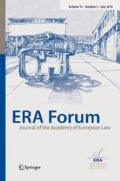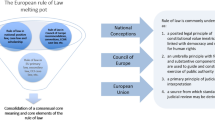Abstract
The article provides a detailed analysis of the different interpretations and alternative scenarios for the implementation of Article 85 of the Treaty on the Functioning of the European Union (TFEU) as regards providing binding powers to Eurojust in exercising two functions: coordination as well as initiation of investigations and prosecutions. In this respect, Art. 85 TFEU opens new prospects, some ambitious, some moderate and some essentially maintaining the status quo. The author examines the advantages and disadvantages of each institutional development scenario succinctly, building upon the valuable conclusions and arguments that have been presented at the strategic seminars organised by Eurojust in past years.
Similar content being viewed by others
Notes
Council Decision of 14 December 2000 setting up a Provisional Judicial Cooperation Unit, OJ no. L 324, 21 December 2000, p. 2 et seq.
Council Decision of 28 February 2002 setting up Eurojust with a view to reinforcing the fight against serious crime, OJ no. L 63, 6 March 2002, p. 1 et seq. Regarding this matter, see, among others, Flore [7], p. 9 et seq.; Mitsilegas [11], p. 187 et seq; Suominen [12], p. 217 et seq.; Thwaites [13], p. 45 et seq.; Barbe [1], p. 8 et seq.; de Biolley [5], p. 167 et seq.; Dehousse/García Martínez [6], p. 161 et seq.; Kahlke [8]; Milke [10]; Klip [9], p. 401 et seq.
OJ no. L 138, 4 June 2009, p. 14 et seq. See De Amicis/Surano [4].
See Art. 8 of the 2002 Eurojust Decision as amended in 2008.
Flore [7], p. 589 et seq.
Regarding this aspect, see, especially, Bures [3], p. 236 et seq.
See especially Art. 31, para 2, (a) ex-TEU and current Art. 85 TFEU, para 1, subpara 1 TFEU; see also Art. 3 of the 2002 Eurojust Decision as amended in 2008 (see also its Arts. 6 and 7).
Arts. 6 and 7 para 1, (a) I of the 2002 Eurojust Decision as amended in 2008.
Art. 85 para 1 subpara 2, (c) TFEU opens also new prospects. However these will not be developed in this contribution. For a detailed analysis of the role of Eurojust and conflicts of jurisdiction, see the contribution by Ignazio Patrone in this issue.
According to the wording of the former Art. 31, para 2 TEU.
According to the wording of Art. 3, para. 1, (a) of the Eurojust Decision as revised in 2008.
Regarding this point, see UK House of Lords, Select Committee on European Union Twenty-Third Report, “Judicial cooperation in the EU: the role of Eurojust”, 2004, para. 88. (http://www.publications.parliament.uk/pa/ld200304/ldselect/ldeucom/138/13802.htm).
About these 3 scenarios for (a), see Seminar entitled “Eurojust and the Lisbon Treaty: Towards more Effective Action”, Bruges, 20–22 September 2010 (Council, doc. 17625/10, 9 Dec. 2010, pp. 15 and 16).
In this regard, see the contribution by J. Vervaele at the seminar entitled “Eurojust: new perspectives in judicial cooperation”, Budapest, 15–17 May 2011 (Council, doc. 14428/11, 21 Sept. 2011, p. 7).
See in this regard the French and German versions: “(…) le déclenchement d’enquêtes pénales ainsi que la proposition de déclenchement de poursuites conduites par les autorités nationales compétentes (…)”; “(…) Einleitung von strafrechtlichen Ermittlungsmaßnahmen sowie Vorschläge zur Einleitung von strafrechtlichen Verfolgungsmaßnahmen, die von den zuständigen nationalen Behörden durchgeführt (…)”. Other linguistic versions, such as the Dutch and Italian ones, seem rather pleading in favour of an interpretation covering prosecutions only “(…) het inleiden van strafrechtelijk onderzoek alsmede het voorstellen van het inleiden van vervolging door de bevoegde nationale autoriteiten (…)”; “(…) l’avvio di indagini penali, nonché la proposta di avvio di azioni penali esercitate dalle autorità nazionali competenti (…)”.
According to Art. 85, para 2 “In the prosecutions referred to in para. 1, and without prejudice to Art. 86, formal acts of judicial procedure shall be carried out by the competent national officials” (our own italics).
About all these interpretation questions, see Weyembergh [14].
See Seminar entitled “Eurojust and the Lisbon Treaty: Towards more Effective Action”, Bruges, 20–22 September 2010 (Council, doc. 17625/10, 9 Dec. 2010, p. 17).
These three arguments are not exhaustive. One can for instance think about a fourth one, in favour of the medium scenario, which is to consider a binding power of initiation of investigation as the logical consequence of Art. 13 of the 2002 Eurojust Decision as revised in 2008.
In line with Art. 2 of the Joint Action 97/827/JHA of 5 December 1997 (OJ, no. L 344, 15 Dec. 1997, p. 1), the Working Party on General Matters including Evaluations (GENVAL) decided at the Meeting on 22 June 2011 that the sixth round of mutual evaluations will be devoted to the practical implementation and operation of the Decisions on Eurojust and the European Judicial Network in criminal matters.
The Eurojust 2011 annual report mentions six formal requests to undertake an investigation or prosecution of specific acts on the basis of Art. 6(1) (a) (i), one formal request to competent authorities to accept that one of them may be in a better position to undertake an investigation or prosecute specific acts on the basis of Art. 6(1) (a) (ii), and three formal requests to competent authorities to accept that one of them may be in a better position to undertake an investigation or prosecute specific acts on the basis of Art. 6(1) (a) (iii) (see the 2011 annual report, pp. 17 and 18).
See the examples provided for, ibid.
Ibid.
The number of cases in which national authorities did not comply with a request made by national members is estimated to be less than five cases a year but there are many more cases in which action agreed is not carried out or only partially or undertaken with a delay (see GHK, Executive summary, study on the strengthening of Eurojust, p. 3).
And more precisely thefts of luxury cars.
See especially Art. 3, para 2 TEU and Art. 67 TFEU.
See Seminar entitled “Eurojust: new perspectives in judicial cooperation”, Budapest, 15–17 May 2011 (Council, doc. 14428/11, 21 Sept. 2011, p. 19).
This formulation did not appear in the first versions of the provision but it was introduced by the Praesidium of the Convention on the Future of the European Union (draft text for sections of Part III with comments, Brussels, 27 May 2003 (27.05), CONV 727/03).
See Seminar entitled “Eurojust and the Lisbon Treaty: Towards more Effective Action”, Bruges, 20–22 September 2010 (Council, doc. 17625/10, 9 Dec. 2010, p. 16).
See Council, doc. 14428/11, 21 Sept. 2011, p. 18.
In this regard see GHK, which especially mentions that investigations could be closed by national authorities immediately after the request made by Eurojust (GHK, Executive summary, study on the strengthening of Eurojust).
In this regard, three levels were identified at the Bruges seminar (see Council, doc. 17625/10, 9 Dec. 2010, p. 16), namely:
-
a minimal level whereby the national member initiates a criminal investigation in his capacity as national authority (see the case of some national members who may already do that according to their national law)
-
a medium level whereby the national member initiates a criminal investigation on behalf of Eurojust;
-
and a maximum level whereby the college of Eurojust acting as a college can initiate an investigation.
-
References
Barbe, E.: Une triple étape pour le troisième pilier de l’Union européenne: mandat d’arrêt européen, terrorisme et Eurojust. RCMEU 454, 5–9 (2002)
Brüner, F.H., Spitzer, H.: Der Europäische Staatsanwalt – ein Instrument zur Verbesserung des Schutzes der EU-finanzen oder ein Betrag zur Verwirklichung eines Europas der Freiheit, der Sicherheit und des Rechts. Neue Z. Strafr. 8, 393–398 (2002)
Bures, O.: Eurojust’s fledging counterterrorism role. J. Contemp. Eur. Res. 6(2), 236–256 (2010)
De Amicis, G., Surano, L.: Il rafforzamento dei poteri di Eurojust a seguito della nuova Decisione 2009/426/GAI. Cassaz. Penale 11, 4453–4467 (2009)
de Biolley, S.: La coordination des enquêtes et des poursuites: la mise en place d’Eurojust. In: Flore, D. (ed.) Actualités de Droit Pénal Européen, Brussels, La Charte, pp. 167–195 (2003)
Dehousse, F., García Martinez, J.: ‘Eurojust’ et la coopération judiciaire pénale. J. Trib., Droit Eur. 6, 161–175 (2004) (Now: Journal de Droit Européen (J.D.E.))
Flore, D.: D’un réseau judiciaire européen à une juridiction pénale européenne: Eurojust et l’émergence d’un système de justice pénale. In: de Kerchove, G., Weyembergh, A. (eds.) L’espace Pénal Européen: Enjeux et Perspectives, Brussels, Brussels University ed., pp. 9–30 (2002)
Kahlke, S.: Eurojust – Auf dem Weg zu einer Europäischen Staatsanwaltschaft? Logos, Berlin (2004)
Klip, A.: European Criminal Law. Intersentia, Antwerp (2009)
Milke, T.: Europol und Eurojust. V & R Unipress GmbH, Göttingen (2003)
Mitsilegas, V.: EU Criminal Law. Hart Publishing, Oxford (2009)
Suominen, A.: The past, present and the future of Eurojust. Maastricht J. Eur. Comp. Law 15(2), 217–234 (2008)
Thwaites, N.: Eurojust autre brique dans l’édifice de la coopération judiciaire en matière pénale ou solide mortier? Rev. Sci. Crim. Droit Pénal Comp. 1, 45–62 (2003)
Weyembergh, A.: The development of Eurojust: potential and limitations of Art. 85 TFEU. New J. Eur. Crim. Law 2(1), 75–99 (2011)
Author information
Authors and Affiliations
Corresponding author
Additional information
This article is based on a presentation given at the conference 10 Years of Eurojust—Operational Achievements and Future Challenges jointly organised by Eurojust and ERA on 12–13 November 2012 in the Hague.
Rights and permissions
About this article
Cite this article
Weyembergh, A. Coordination and initiation of investigations and prosecutions through Eurojust. ERA Forum 14, 177–186 (2013). https://doi.org/10.1007/s12027-013-0314-z
Published:
Issue Date:
DOI: https://doi.org/10.1007/s12027-013-0314-z



